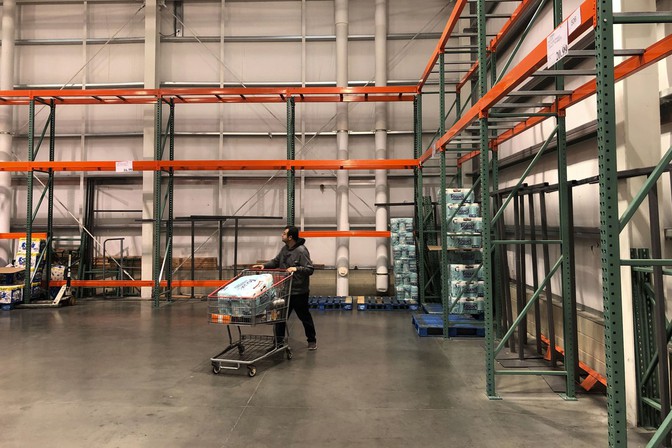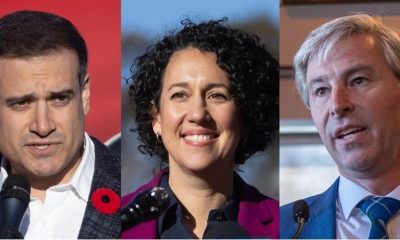It’s Monday, March 9. As the stock market flails, the best response is to do nothing, Annie Lowrey writes. Italy’s now-nationwide quarantine efforts are a harbinger.
In the rest of today’s newsletter: What mass quarantines could look like in the U.S. Plus: The empty public spaces of a world in the middle of a viral outbreak.
*
« TODAY IN POLITICS »

(The Atlantic)
It may seem like a measure that’s more apt for a Hollywood blockbuster than real life, but mass quarantines are here.
A drastic public-health step was implemented early on in Wuhan, China, where some 50 million people were on lockdown as the government attempted to control the spread of COVID-19.
With the number of the coronavirus cases on a frightening upward trajectory in the United States, schools and colleges are starting to shutter their doors while sporting events and concerts are getting canceled. Could a government-mandated quarantine happen here?
Italy’s quick turn to nationwide containment measures could be a harbinger for many countries. On Sunday, the country placed severe travel restrictions on the entire Lombardy region in the north of the country—the first such crackdown in a democracy since the virus took hold earlier in the year. “Italy’s measures … may not be the exception,” our European correspondent Rachel Donadio writes. “They may soon become the rule.”
China’s authoritarian structure made it a whole lot easier for the country to slap down harsh travel restrictions when the COVID-19 outbreak started. But the problem with the censorship and surveillance needed to sustain such measures is that it can backfire if people become too afraid to say anything at all.
How would a quarantine actually work in the U.S.? It would be an utter mess. Part of the reason is that the federal government can’t just step in with a quarantine: America’s public-health system is split into 2,684 state, local, and tribal public-health departments, and each of them have the jurisdiction over imposing quarantines if needed.
Finally, the nightmare scenario some U.S. school administrators have feared is nearing: that most schools in the U.S. would have to close to prevent the spread of COVID-19. That’s already happened in Hong Kong, where kids have been away for more than a month already out of an abundance of caution. What can U.S. parents and school-age kids expect?
—Saahil Desai and Christian Paz
*
« IDEAS AND ARGUMENTS »

(Elizabeth Frantz / Reuters)
1. “To survive long enough to become the unity candidate, Biden first had to be persuaded to rip into his rivals.”
Joe Biden’s primary campaign appeared nearly dead in the water until he jetted off to South Carolina on the night of the New Hampshire primary, not even staying for results in the small early state. From there, it was his pivot to attack mode that helped him take off ahead of Super Tuesday, Edward-Isaac Dovere reports.
2. “‘Electability’ claims to be a benign and objective concern. It is neither. It merely outsources biases…”
Phrases such as “I’d vote for a woman, just not that woman,” and “she’s not what this country is ready for” mask an insidious kind of sexism that feigns concern to hide internal prejudices, Megan Garber argues: It’s easier to blame an imagined “other” for sexism than confront your own bias.
3. “Can a woman ever—really, actually, not just as a rhetorical question or thought exercise—become president?”
That’s the question that Nanette Burstein, the director of the new Hulu documentary about Hillary Clinton, was trying to answer in her latest film project. And Hillary (the documentary, not the person) accomplishes that without “cinematic flair,” our culture reporter Shirley Li writes.
*
« SNAPSHOTS »
A customer walks past mostly empty shelves that normally hold toilet paper and paper towels at a Costco store in Teterboro, New Jersey, on March 2. (Seth Wenig / AP)
When Everyone Stays Home
In cities and regions hard-hit by the coronavirus crisis, quarantine measures and self-isolation efforts have left many public spaces deserted. Classrooms, plazas, malls, sports venues, cafes, houses of worship, and tourist destinations appear eerily empty as people stay home, cancel plans, and await further news.
Our photo editor Alan Taylor put together this photo essay of large parts of the world on pause.
*
Today’s newsletter was written by Saahil Desai, an editor on the Politics desk, and Christian Paz, a Politics fellow. It was edited by Shan Wang, who oversees newsletters.
You can reply directly to this newsletter with questions or comments, or send a note to politicsdaily@theatlantic.com.
Your support makes our journalism possible. Subscribe here.
We want to hear what you think about this article. Submit a letter to the editor or write to letters@theatlantic.com.































